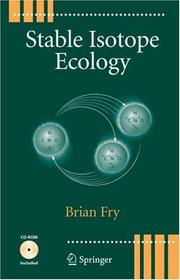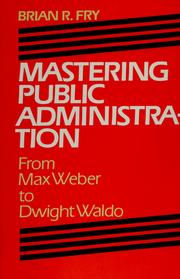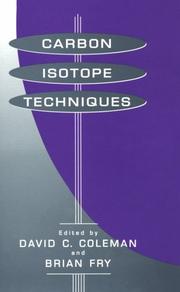| Listing 1 - 10 of 10 |
Sort by
|
Book
ISBN: 0387337458 Year: 2006 Publisher: New York, NY : Springer New York : Imprint: Springer,
Abstract | Keywords | Export | Availability | Bookmark
 Loading...
Loading...Choose an application
- Reference Manager
- EndNote
- RefWorks (Direct export to RefWorks)
Stable isotopes are frequently used as tracers in biological systems, and their ability to track changes and processes over time has made them increasingly important to ecological research. For ecologists, stable isotopes provide a natural way to directly trace details of element cycling in the environment. Stable Isotope Ecology provides a solid introduction to this advanced subject, and can also be used as an instructive review for more experienced researchers and professionals. The book approaches the use of isotopes from the perspective of ecological and biological research, but its concepts can be applied within other disciplines as well. In order to enable scientists to establish source-sink connections in ecological settings, Stable Isotope Ecology begins by reviewing fundamental topics of tracer fractionation and mixing. Several mini-reviews profile problems and successes encountered with isotope tracing in particular focus areas, while emphasizing the role that humans increasingly play in changing our planetary ecosphere. A novel, step-by-step spreadsheet modeling approach is also presented for circulating tracers in any ecological system, including any favorite system an ecologist might dream up while sitting at a computer. Just type in values and watch the isotope action unfold in the dynamic models. Fry's humorous and lighthearted style painlessly imparts the principles of isotope ecology, using a unique, hands-on approach to engage students. The mechanics of fractionation and mixing are laid out in simple steps, with numerous examples and accessible mathematics (algebra only). The book encourages students to begin their own pilot project with stable isotopes. About the Author: Dr. Brian Fry is a Professor in the Coastal Ecology Institute and the Department of Oceanography and Coastal Studies at Louisiana State University in Baton Rouge, Louisiana. His mother and father both used isotopes in their research careers, so he is a second generation isotope scientist.
Ecology --- Stable isotopes in ecological research. --- Research. --- Ecological research --- Research --- Ecology. --- Climatic changes. --- Molecular ecology. --- Soil conservation. --- Climate Change. --- Molecular Ecology. --- Soil Science & Conservation. --- Biogeosciences. --- Geoecology/Natural Processes. --- Conservation of soil --- Erosion control, Soil --- Soil erosion --- Soil erosion control --- Soils --- Agricultural conservation --- Soil management --- Molecular biology --- Changes, Climatic --- Changes in climate --- Climate change --- Climate change science --- Climate changes --- Climate variations --- Climatic change --- Climatic changes --- Climatic fluctuations --- Climatic variations --- Global climate changes --- Global climatic changes --- Climatology --- Climate change mitigation --- Teleconnections (Climatology) --- Balance of nature --- Biology --- Bionomics --- Ecological processes --- Ecological science --- Ecological sciences --- Environment --- Environmental biology --- Oecology --- Environmental sciences --- Population biology --- Control --- Prevention --- Conservation --- Molecular aspects --- Environmental aspects --- Life sciences. --- Ecology . --- Climate change. --- Soil science. --- Geobiology. --- Geoecology. --- Environmental geology. --- Geoecology --- Environmental protection --- Physical geology --- Earth sciences --- Biosphere --- Pedology (Soil science) --- Agriculture --- Global environmental change

ISBN: 9780387305134 9780387337456 0387305130 0387337458 Year: 2006 Publisher: New York : Springer,
Abstract | Keywords | Export | Availability | Bookmark
 Loading...
Loading...Choose an application
- Reference Manager
- EndNote
- RefWorks (Direct export to RefWorks)
Stable isotopes are frequently used as tracers in biological systems, and their ability to track changes and processes over time has made them increasingly important to ecological research. For ecologists, stable isotopes provide a natural way to directly trace details of element cycling in the environment. Stable Isotope Ecology provides a solid introduction to this advanced subject, and can also be used as an instructive review for more experienced researchers and professionals. The book approaches the use of isotopes from the perspective of ecological and biological research, but its concepts can be applied within other disciplines as well. In order to enable scientists to establish source-sink connections in ecological settings, Stable Isotope Ecology begins by reviewing fundamental topics of tracer fractionation and mixing. Several mini-reviews profile problems and successes encountered with isotope tracing in particular focus areas, while emphasizing the role that humans increasingly play in changing our planetary ecosphere. A novel, step-by-step spreadsheet modeling approach is also presented for circulating tracers in any ecological system, including any favorite system an ecologist might dream up while sitting at a computer. Just type in values and watch the isotope action unfold in the dynamic models. Fry's humorous and lighthearted style painlessly imparts the principles of isotope ecology, using a unique, hands-on approach to engage students. The mechanics of fractionation and mixing are laid out in simple steps, with numerous examples and accessible mathematics (algebra only). The book encourages students to begin their own pilot project with stable isotopes. About the Author: Dr. Brian Fry is a Professor in the Coastal Ecology Institute and the Department of Oceanography and Coastal Studies at Louisiana State University in Baton Rouge, Louisiana. His mother and father both used isotopes in their research careers, so he is a second generation isotope scientist.
Stable isotopes in ecological research. --- Stable isotopes in ecological research --- GG Geochemistry --- Ecology --- Geochemie --- Research
Digital
ISBN: 9780387337456 Year: 2006 Publisher: New York, NY Springer Science+Business Media, LLC
Abstract | Keywords | Export | Availability | Bookmark
 Loading...
Loading...Choose an application
- Reference Manager
- EndNote
- RefWorks (Direct export to RefWorks)
Meteorology. Climatology --- Biogeography --- Molecular biology --- General ecology and biosociology --- Pedology --- bodemkunde --- systematische plantkunde --- moleculen --- bodembescherming --- biogeografie --- ecologie --- moleculaire biologie --- klimaatverandering

ISBN: 1593322488 9781593322489 1593321937 9781593321932 Year: 2007 Publisher: New York LFB Scholarly Pub.
Abstract | Keywords | Export | Availability | Bookmark
 Loading...
Loading...Choose an application
- Reference Manager
- EndNote
- RefWorks (Direct export to RefWorks)
Immigrants --- Nativism. --- Anti-Catholicism --- Catholics --- Government policy --- United States --- Emigration and immigration --- Government policy. --- Nativism --- Immigrants - Government policy - United States --- United States - Emigration and immigration - Government policy

ISBN: 093454056X Year: 1998 Publisher: Chatham Chatham House
Abstract | Keywords | Export | Availability | Bookmark
 Loading...
Loading...Choose an application
- Reference Manager
- EndNote
- RefWorks (Direct export to RefWorks)

ISBN: 0121797317 0121797309 1299193587 032315767X Year: 1991 Publisher: San Diego Academic Press
Abstract | Keywords | Export | Availability | Bookmark
 Loading...
Loading...Choose an application
- Reference Manager
- EndNote
- RefWorks (Direct export to RefWorks)
Carbon Isotope Techniques is a hands-on introduction to using carbon isotope tracers in experimental biology and ecology. It provides an easy bench-top reference with many simple-to-follow protocols for studying plants, animals, and soils. The 11C, 12C, 13C, and 14C carbon isotopes are considered and standard techniques are described by established authors. This is a synthetic compilation of well-established techniques. Researchers and students in a wide range of disciplines spanning plant and soil science, agricultural chemistry, forestry, ecology, oceanography, limnology, biogeochemistry, anthropology, and archaeology will find Carbon Isotope Techniques a valuable resource. Key Features * Features isotopes in ecological research * Highlights specific user-oriented techniques * Considers carbon cycle in plants, soils, animals, air, and water * Provides examples and sample calculations for radioisotopes in plant, soil, and aquatic biology
Biology --- Carbon --- Stable isotope tracers. --- Technique. --- Isotopes.
Book
ISBN: 9780387337456 Year: 2006 Publisher: New York, NY Springer Science+Business Media, LLC
Abstract | Keywords | Export | Availability | Bookmark
 Loading...
Loading...Choose an application
- Reference Manager
- EndNote
- RefWorks (Direct export to RefWorks)
Stable isotopes are frequently used as tracers in biological systems, and their ability to track changes and processes over time has made them increasingly important to ecological research. For ecologists, stable isotopes provide a natural way to directly trace details of element cycling in the environment. Stable Isotope Ecology provides a solid introduction to this advanced subject, and can also be used as an instructive review for more experienced researchers and professionals. The book approaches the use of isotopes from the perspective of ecological and biological research, but its concepts can be applied within other disciplines as well. In order to enable scientists to establish source-sink connections in ecological settings, Stable Isotope Ecology begins by reviewing fundamental topics of tracer fractionation and mixing. Several mini-reviews profile problems and successes encountered with isotope tracing in particular focus areas, while emphasizing the role that humans increasingly play in changing our planetary ecosphere. A novel, step-by-step spreadsheet modeling approach is also presented for circulating tracers in any ecological system, including any favorite system an ecologist might dream up while sitting at a computer. Just type in values and watch the isotope action unfold in the dynamic models. Fry's humorous and lighthearted style painlessly imparts the principles of isotope ecology, using a unique, hands-on approach to engage students. The mechanics of fractionation and mixing are laid out in simple steps, with numerous examples and accessible mathematics (algebra only). The book encourages students to begin their own pilot project with stable isotopes. About the Author: Dr. Brian Fry is a Professor in the Coastal Ecology Institute and the Department of Oceanography and Coastal Studies at Louisiana State University in Baton Rouge, Louisiana. His mother and father both used isotopes in their research careers, so he is a second generation isotope scientist.
Meteorology. Climatology --- Biogeography --- Molecular biology --- General ecology and biosociology --- Pedology --- bodemkunde --- systematische plantkunde --- moleculen --- bodembescherming --- biogeografie --- ecologie --- moleculaire biologie --- klimaatverandering
Book
ISBN: 9780121797317 Year: 1991 Publisher: San Diego (Calif.) Academic Press
Abstract | Keywords | Export | Availability | Bookmark
 Loading...
Loading...Choose an application
- Reference Manager
- EndNote
- RefWorks (Direct export to RefWorks)
Book
ISBN: 1483322769 1506374522 9781483301044 1483301044 Year: 2014 Publisher: Washington, D.C. : CQ Press,
Abstract | Keywords | Export | Availability | Bookmark
 Loading...
Loading...Choose an application
- Reference Manager
- EndNote
- RefWorks (Direct export to RefWorks)
In Mastering Public Administration, each chapter spotlights a significant theorist in the field, covering his/her life, research, writings, and impact, introducing the discipline's most important scholarship in both a memorable and approachable manner. The combination of biographical narrative with explanation and analysis makes abstract theories understandable while showing how subject scholars relate to each other in their work, providing much needed context. The book's chronological organization shows the evolution of public administration theory over time. With the new edition, the authors will be adding mini-chapters that link contemporary scholars and their research to the seminal literature.
Book
Year: 2015 Publisher: [New Orleans, La.] : U.S. Department of the Interior, Bureau of Ocean Energy Management, Gulf of Mexico OCS Region,
Abstract | Keywords | Export | Availability | Bookmark
 Loading...
Loading...Choose an application
- Reference Manager
- EndNote
- RefWorks (Direct export to RefWorks)
| Listing 1 - 10 of 10 |
Sort by
|

 Search
Search Feedback
Feedback About UniCat
About UniCat  Help
Help News
News